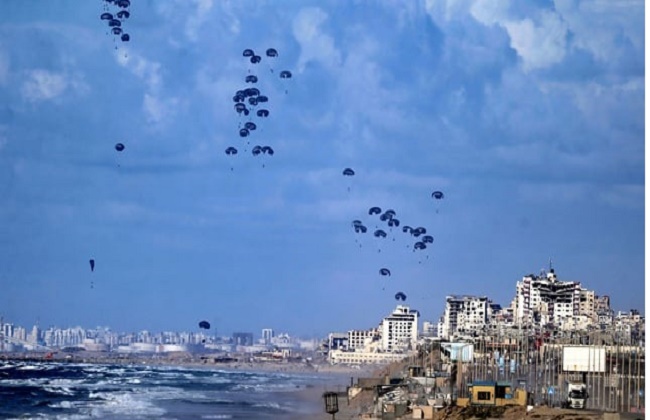
An international effort is gathering pace to get desperately needed humanitarian relief into Gaza by sea in a bid to counter overland access restrictions blamed on Israel as it battles Hamas militants.
The dire conditions more than five months into the war have led some countries to airdrop food and other assistance over the besieged Gaza Strip, but a parachute malfunction turned the latest operation lethal on Friday.
Five Palestinians were killed and 10 wounded north of the coastal Al-Shati refugee camp, said Mohammed al-Sheikh, emergency room head nurse at Gaza City’s Al-Shifa hospital.
A witness told AFP he and his brother followed the parachuted aid in the hope of getting “a bag of flour”.
“Then, all of a sudden, the parachute didn’t open and fell down like a rocket,” hitting a house, said Mohammed al-Ghoul.
Jordanian and US military officials denied that aircraft from either country caused the fatalities.
“We express sympathies to the families of those who were killed,” the US Central Command said in a statement.
“Contrary to some reports, this was not the result of U.S. airdrops.”
Belgium, Egypt, France and the Netherlands were also involved in the airdrop.
In the Cypriot port of Larnaca, European Commission chief Ursula von der Leyen expressed hope that a maritime corridor could open this Sunday, although details remained unclear.
She said a “pilot operation” was to be launched on Friday, aided by the United Arab Emirates which secured “the first of many shipments of goods to the people of Gaza”.
US President Joe Biden said in Thursday’s State of the Union address that the US military would build a “temporary pier” off Gaza’s coast to bring in aid.
He told reporters on Friday that Israeli Prime Minister Benjamin Netanyahu must allow in more aid, a day after he warned Israeli leaders against using aid as “a bargaining chip”.
The United Nations has repeatedly warned of looming famine in the Gaza Strip, which is under Israeli siege following the October 7 attack by Hamas that triggered the war.
UN agencies have urged increased overland access, insisting that air or sea delivery was ineffective.
Biden acknowledged that hopes for a new truce deal before Ramadan, the Muslim fasting month that could begin on Sunday depending on the lunar calendar, were “looking tough”.
Hamas’s unprecedented October attack on southern Israel resulted in about 1,160 deaths, most of them civilians, according to Israeli official figures.
Israel has responded with a relentless offensive that the health ministry in Hamas-run Gaza said has killed at least 30,878 people, mostly women and children.
Hamas militants also took about 250 hostages, some of whom were released during a week-long truce in November. Israel believes 99 hostages remain alive in Gaza and that 31 have died.
After a week of talks with mediators in Cairo failed to produce a breakthrough, Hamas’s armed wing said it would not agree to a hostage-prisoner exchange without the withdrawal of Israeli forces.
Ezzedine al-Qassam Brigades spokesman Abu Obeida said “there is no compromise on this”.
Hamas negotiators left Cairo to consult with the movement’s leadership in Qatar but US officials deniedthe negotiations had broken down.
“The ball is in their court,” US Secretary of State Antony Blinken said in Washington.
Israel, which withdrew from Gaza in 2005 but has maintained control over its airspace and territorial waters, said it “welcomes” the planned maritime corridor.
There are no functioning ports in Gaza and officials did not say where initial shipments would go, whether they would be subject to inspection by Israel, or who would distribute aid.
The Pentagon said on Friday the plan to establish the “Joint Logistics Over-the-Shore” port would take up to 60 days and likely involve up to 1,000 US personnel.
Once established, it “could provide more than two million meals to the citizens of Gaza per day”, Pentagon spokesman Major General Pat Ryder told reporters in Washington.
The pier would allow ships to transfer cargo to smaller vessels to transport and offload onto a temporary causeway for delivery to Gaza, said Ryder, who repeated Biden’s promise that there would be no US troops on the ground in Gaza.
US officials said the plan builds on the maritime aid corridor proposed by Cyprus — the closest European Union member to Gaza.
However, Michael Fakhri, the UN special rapporteur on the right to food, said Washington’s “absurd” pier proposal would not “prevent starvation and famine by any definition”.
A Biden administration official said Israel has agreed to open a new land crossing that would “allow for aid to flow directly to the population in northern Gaza”, starting “over the coming week”.
British foreign minister David Cameron said “we need 500 trucks a day or more going into Gaza”, but the past five days have averaged just 123.
Cameron also called on Israel to ensure the “full resumption” of water and electricity supplies.
Desperate residents in Gaza’s north have swarmed the aid trucks that have made it into the territory.
More than 100 Palestinians were killed on February 29 when Israeli forces opened fire on crowds scrambling for aid from a convoy in north Gaza, according to Gaza’s health ministry.
Israel’s military said on Friday its initial investigation found troops “fired precisely” at suspects who posed a threat to them.
Roughly 1.5 million Palestinians have sought refuge in Rafah, in Gaza’s far south, but there, too, they are not safe.
At the city’s Al-Najjar hospital, a man held the body of a child killed in a bombardment, shrouded in a blood-soaked white cloth.
“We do not feel the joy of Ramadan approaching,” said displaced Palestinian woman Nevin al-Siksek.


